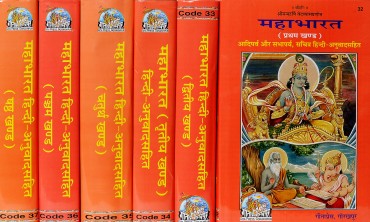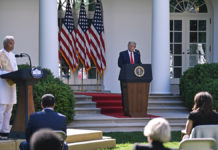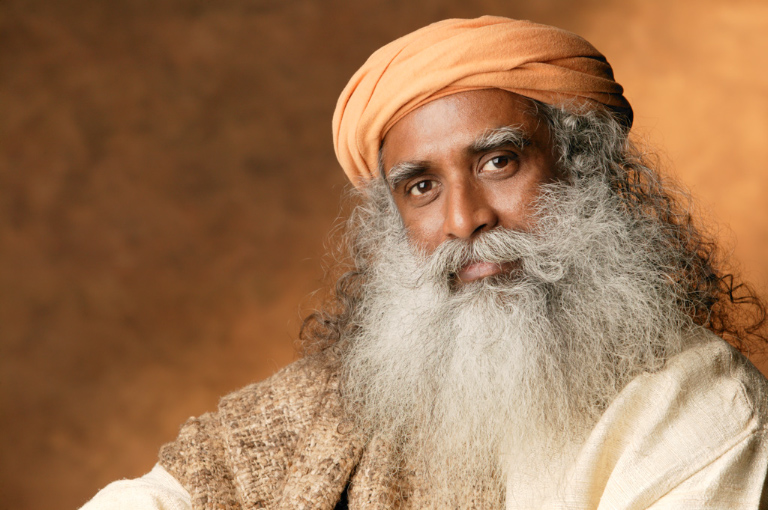(Editor’s note: With over 100,000 shlokas, Mahabharata is the longest and most important epic of India. It also includes the powerful Gita. Some read it as a history, some as a novel or work of fiction, some as philosophy or some as divine voice of God. Similarly, it has many interpretations. The article below, written by an unnamed author, explains the very essence of Mahabharata in a mere 560 words. We tried to find who wrote this and were unsuccessful. If you know who authored it, please do inform us and we will gratefully credit the author.)
An interpretation of Mahabharata
By Author Unknown
It was said in the texts that eighty percent of the fighting male population of the civilization was wiped out in the eighteen days of the war.
At the end of the war, Sanjay went to the spot where the greatest war had been raged: Kurukshetra. He looked around and wondered if the war had really happened, if the ground beneath him had soaked all that blood, if the great Pandavas and Krishna had stood where he was now.
“You will never know the truth about that!” said an aging soft voice.
Sanjay turned around to find an old man in saffron robes emerging from a column of dust.
 “I know that you are here to find out about the Kurukshetra war; but you cannot know about that war till you know what the war was all about,” the old man said enigmatically.
“I know that you are here to find out about the Kurukshetra war; but you cannot know about that war till you know what the war was all about,” the old man said enigmatically.
“What do you mean?”
“The Mahabharata is an Epic, a ballad, perhaps a reality but even more than that it is a philosophy.”
The old man smiled knowingly as Sanjay was entangled in a web questions.
“Can you tell me what that philosophy is?” Sanjay requested.
Sure, began the old man.
“The Pandavas are nothing but your five senses: Sight, Smell, Sound, Taste and Touch. Do you know what the Kauravas are?” he asked narrowing his eyes. Seeing the perplexity in Sanjay’s eyes, he continued,
“The Kauravas are the hundred vices that attack your senses everyday but you can fight them. Do you know how?”
Sanjay shook his head.
“When Krishna rides your chariot!” The old man smiled brighter and Sanjay gasped at that gem of insight.
“Krishna is your inner voice, your soul, your guiding light. If you place your life in his hands, you have nothing to worry.”
Sanjay was dumbstruck for a moment but came around quickly with another question, “If the Kauravas are vices, why then are Dronacharya and Bhishma on their side?”
The old man nodded, sadder for the question.
“It just means that as you grow up your perception of your elders changes. The elders who were perfect in your eyes during your growing years are not all that perfect, after all. They have faults. One day you will have to decide if your faith in them is misplaced or otherwise. Then you may also realize that you will be required to fight them as well, and for valid reasons. It is the hardest part of growing up and that is why the Geeta is important.”
Sanjay slumped down on the ground, not because he was tired but because he could understand and was struck by the enormity of it all.
“What about Karna?” he whispered.
“Ah!” said the old man. “You have saved the best for last. Karna is the brother to your senses. He is desire and very much a part of you but stands with the vices. He feels wronged and makes excuses for being with the vices as do your desires all the time.”
Sanjay wondered in silence, “Is desire not a valid excuse to embrace vices?”
He stood peering at the ground which was once a battlefield, consumed by a million thoughts, trying to make sense of it all. When he looked up the old man was nowhere in sight.
He seemed to have disappeared in the column of dust, leaving behind the greatest philosophy of Life.















Regarding the MAHABHARATA UNEARTHED: THE POWERFUL EPIC EXPLAINED IN 565 WORDS
This is nothing important or, with the least importance, when we see it relating to the Mahabharata As It Is and searching this type of authors to punish for trying to concoct the literature, even like the Mahabharata and Gita is OK. Otherwise, has it any importance?
Where can we find his Mahabharata Book? You failed to include that in your news item.
Anoop Desai
anoopdesai1@gmail.com
Such failure. Such disgrace
I found this a fascinating interpretation and actually really enjoyed it. But the Mahabharata is so huge, so many unrelated stories tied together in a complex web, that it is a shame to try and distill it down to such a simple message. In this way, I think it is horribly wrong. I have seen Christians and Jews try to do the same with their anthologies. To much is lost, I am afraid. Though I understand the temptation.